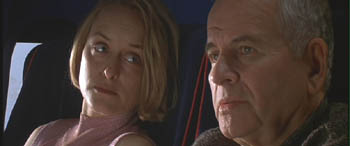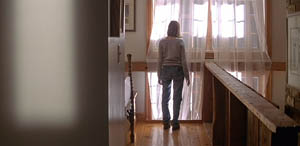|
If you're looking for a happy, feel-good movie that'll give you the most pleasant of dreams, you might be looking in the wrong place. But if you're just looking for an excellent movie, then go no further. With your search, I mean. Feel free to go further into this review.  It could be observed, and indeed has been, by myself at least, that Atom Egoyan's films can often feel very aloof and cold, content to sit and do their own things without really ever glancing up to see if the audience is there. This sense of distancing can make his films somewhat hard to get a good grip on, but happily, The Sweet Hereafter isn't encumbered by those factors at all. It does, on the other hand, still retain all of its director's interesting structural ideas, and the result is a very smart, intellectual drama that doesn't let its own arty aspirations derail the emotional core of the story. When I say emotional, realize that I mean the sorts of chilling emotions that cut right to the heart of everyone's most vulnerable side. This isn't one of those "Hollywood-important" films like On Golden Pond or Terms of Endearment that offer up neat, prepackaged sentiment for the consumption of the Academy. The feelings dealt with in this film are precisely the ones that people are least effective at dealing with: grief, helplessness, rage, regret...a veritable cornucopia of our collective lowest ebbs. If that sounds somewhat daunting, it should, but The Sweet Hereafter isn't about wallowing in despair, and indeed the primary point behind the film is how we can deal with such things and move on without becoming lesser people for it. The ever-brilliant Ian Holm (whom I suspect will be remembered by most as Mr. Bilbo Baggins) plays Mitchell Stephens, a lawyer who has come to an unnamed Canadian rural community following a terrible school bus crash that claimed the lives of a good portion of the town's young children. The itinerant litigator moves through the grieving town, plying his dramatic sales pitch of promised retribution against an illusory wrongdoer or wrongdoers in order to generate a class-action lawsuit against the makers of the bus, the town, the DOT, or anyone else who might appear culpable. Many of the parents agree to follow Stephens' lead, while others are decidedly unwelcoming of his presence. The film lays bare the grand New World tradition of cashing in on suffering, be it that of others or your own, and the general ugliness of the whole affair is openly dissected. The notion that "healing" or "closure" comes from pointing fingers and profiting off of anyone possible is a truly grotesque idea indeed, and the film's real heroes are those who manage to spurn the quick-fix of the blame game and keep their dignity in the face of tragedy. It would have been all too easy to make Stephens out as an ambulance-chasing vulture, but nothing here is so cut-and-dried as that. Despite what seems to be a blatant attempt at exploitation of a terrible event on his part, there's also undeniably an aspect of his character that sincerely believes he's doing the right thing. As the story unfolds, it becomes clear that his own life has turned out less than satisfying, and has left him a driven person, a good man at heart with a obsessive need to punish someone for the fact that life really isn't fair. No one in the film is a unidimensional cutout, and everyone we meet is capable of good and bad choices. Like Egoyan's other films, The Sweet Hereafter doesn't follow a straightforward, linear narrative, instead weaving back and forth through multiple timelines, telling the overall story in order of the relevance of events. For all that, it's surprisingly clear and coherent, never becoming confusing for the sake of its unconventional approach. The events preceding and following the bus crash build in parallel arcs, interwoven with a third timeline occurring several years later as Stephens recounts the near-loss of his daughter at age three. His dramatic, impassioned telling of the story mirrors his equally Shakespearean sales pitch to the parents of the children lost in the accident, with his promises to exact retribution for the sakes of other innocents exposing the real pain behind his misguided actions. 
If Holm's character is the primary motivator behind the story, the other characters are no less believable or well-acted. Bruce Greenwood (who had previously starred in Egoyan's Exotica) plays Billy Ansel, a single father who lost both his kids in the wreck, and would far prefer if Stephens would leave the grieving to their grief instead of creating even more in the pursuit of some unachievable recompense. Sarah Polley (also of Exotica,) a gifted young actress whose output seems to be almost solely (and sadly) relagated to short-lived art-house productions that never make it to video, nearly takes over the screen as Nicole, the one surviving student from the crash, who sees through Stephens' intentions from square one and has her own reasons for throwing some cold water of reality in the face of her father (who has all too eagerly joined in on the suit.) It's a testament to the strength of the actors that much of the character dynamics and motivations are played on the faces of the characters instead of appearing in dialogue. It also means that the viewer needs to pay close attention, though if you manage to find yourself distracted while in the middle of this film, I'd be hard pressed to comprehend the damage done to your attention span. In short (okay, that's a lie), The Sweet Hereafter is a film filled with fantastic performances and ingenious direction and scripting. It never fails to give me the chills (maybe it's all those snow-covered landscapes) and dance through my head days after viewing. It may not be a fun movie per se, but it's a beautiful one in its own way, and unlike the vast majority of films out there, it actually has something of value to say, and says it with elegance.
-review by Matt Murray
|
|
||||||||